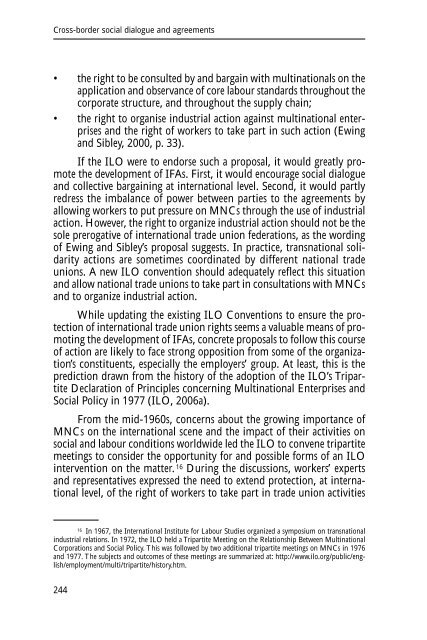CROSS-BORDER SOCIAL DIALOGUE AND AGREEMENTS: An ...
CROSS-BORDER SOCIAL DIALOGUE AND AGREEMENTS: An ...
CROSS-BORDER SOCIAL DIALOGUE AND AGREEMENTS: An ...
You also want an ePaper? Increase the reach of your titles
YUMPU automatically turns print PDFs into web optimized ePapers that Google loves.
Cross-border social dialogue and agreements<br />
• the right to be consulted by and bargain with multinationals on the<br />
application and observance of core labour standards throughout the<br />
corporate structure, and throughout the supply chain;<br />
• the right to organise industrial action against multinational enterprises<br />
and the right of workers to take part in such action (Ewing<br />
and Sibley, 2000, p. 33).<br />
If the ILO were to endorse such a proposal, it would greatly promote<br />
the development of IFAs. First, it would encourage social dialogue<br />
and collective bargaining at international level. Second, it would partly<br />
redress the imbalance of power between parties to the agreements by<br />
allowing workers to put pressure on MNCs through the use of industrial<br />
action. However, the right to organize industrial action should not be the<br />
sole prerogative of international trade union federations, as the wording<br />
of Ewing and Sibley’s proposal suggests. In practice, transnational solidarity<br />
actions are sometimes coordinated by different national trade<br />
unions. A new ILO convention should adequately reflect this situation<br />
and allow national trade unions to take part in consultations with MNCs<br />
and to organize industrial action.<br />
While updating the existing ILO Conventions to ensure the protection<br />
of international trade union rights seems a valuable means of promoting<br />
the development of IFAs, concrete proposals to follow this course<br />
of action are likely to face strong opposition from some of the organization’s<br />
constituents, especially the employers’ group. At least, this is the<br />
prediction drawn from the history of the adoption of the ILO’s Tripartite<br />
Declaration of Principles concerning Multinational Enterprises and<br />
Social Policy in 1977 (ILO, 2006a).<br />
From the mid-1960s, concerns about the growing importance of<br />
MNCs on the international scene and the impact of their activities on<br />
social and labour conditions worldwide led the ILO to convene tripartite<br />
meetings to consider the opportunity for and possible forms of an ILO<br />
intervention on the matter. 16 During the discussions, workers’ experts<br />
and representatives expressed the need to extend protection, at international<br />
level, of the right of workers to take part in trade union activities<br />
16<br />
In 1967, the International Institute for Labour Studies organized a symposium on transnational<br />
industrial relations. In 1972, the ILO held a Tripartite Meeting on the Relationship Between Multinational<br />
Corporations and Social Policy. This was followed by two additional tripartite meetings on MNCs in 1976<br />
and 1977. The subjects and outcomes of these meetings are summarized at: http://www.ilo.org/public/english/employment/multi/tripartite/history.htm.<br />
244
















